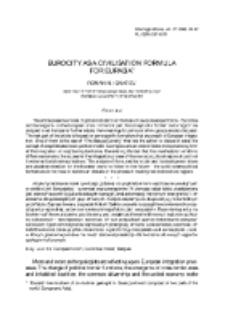- Search in all Repository
- Literature and maps
- Archeology
- Mills database
- Natural sciences
Advanced search
Advanced search
Advanced search
Advanced search
Advanced search

Object
Title: Eurocity as a Civilisation Formula for Eurasia
Subtitle:
Publisher:
Institute of Archaeology and Ethnology Polish Academy of Sciences
Place of publishing:
Description:
Type of object:
Abstract:
The article presents a model of global civilization on the basis of newly developed forms — Eurocities and Euroregions — in the European Union. In the first part, the concepts of a "border" and a "region" are analyzed to set the base for further debate; their meanings for particular ethnic groups are also discussed. The next part of the article is focused on some specific formations that are a result of European integration. One of them is the case of "The Basque Eurocity" that lets the author to discuss in detail the concept of a sophisticated socio-political model. Euroregions are an internal factor and a promising form of the integration of neighboring territories. Considering the fact that the manifestation of ethnic differences remains, the success for the integration process of the new sociocultural regions should not involve territorial reinterpretations. The analysis of the eurocities model and its development shows one plausible direction for the Eurasian world to follow in the future — the world where political borders would not have to become an obstacle in the process of creating new sociocultural regions
References:
Cross-Border Environmental Planning for the 'Bayonne-San Sebastian Eurocity' (E/F) 1999, LACE Infosheet CX4, 12
Eurorregión — Euroeskualdea — Euroregion en cifras — zenbakitan — en chiffres. Aquitaine. Euskal AE / C.A. de Euskadi. Nafarroako FE / C.F. de Navarra, 2000
Harguindéguy J.-B. 2004, La cooperation transfrontaliere franco-espagnole face a ses contradictions (Note), Etudes internationales, 35/2 Juin
Infraestructuras y transporte, un reto para los Pirineos 2001, Barcelona
El Libro Blanco de la Eurociudad Bayonne — San-Sebastian. Documento de los Gabinetes de Consultoria. Documento síntesis para el debato 2000, eds E. Leira, R. Argueso
Mandelstam O. 1990, Pshenica chelovecheskaja, [in:] ed. O. Mandelstam, Sochinenija, II, Moskva
Medem J. 2003, La pelota vasca, la piel contra la piedra, Madrid
Schroedter E. 2003, An den neuen Grenzen von Europa. Begegnungen auf einer Reise durch die Karpaten, Berlin
Relation:
Volume:
Start page:
End page:
Detailed Resource Type:
Format:
Resource Identifier:
oai:rcin.org.pl:61489 ; 0137-4079
Source:
IAiE PAN, call no. P 366 ; IAiE PAN, call no. P 367 ; IAiE PAN, call no. P 368 ; click here to follow the link
Language:
Rights:
Rights Reserved - Restricted Access
Terms of use:
Digitizing institution:
Institute of Archaeology and Ethnology of the Polish Academy of Sciences
Original in:
Library of the Institute of Archaeology and Ethnology of the Polish Academy of Sciences
Access:
Object collections:
- Digital Repository of Scientific Institutes > Partners' collections > Institute of Archeology and Ethnology PAS > Institute Publications
- Digital Repository of Scientific Institutes > Partners' collections > Institute of Archeology and Ethnology PAS > Institute Publications > Current Journals
- Digital Repository of Scientific Institutes > Literature > Journals/Articles
- Digital Repository of Scientific Institutes > Partners' collections > Institute of Archeology and Ethnology PAS > Institute Publications > Current Journals > Ethnologia Polona
Last modified:
Feb 2, 2022
In our library since:
Jan 12, 2017
Number of object content downloads / hits:
17
All available object's versions:
https://rcin.org.pl./publication/77283
Show description in RDF format:
Show description in RDFa format:
Show description in OAI-PMH format:
| Edition name | Date |
|---|---|
| Ignatiev, Roman N., 2006, Eurocity as a Civilisation Formula for Eurasia | Feb 2, 2022 |
Objects Similar
Kolosov, Vladimir Więckowski, Marek [1971- ]. Autor
Więckowski, Marek (1971– )
Sagan, Iwona Kolosov, Vladimir Studzińska, Dominika Zotova, Maria Sebentsov, Alexander Nowicka, Klaudia
Bar-Kołelis, Delia Wendt, Jan A
Komornicki, Tomasz
Le Mouel, Pierre
Nagy, Imre Ricz, András Fekete, Renata

 INSTYTUT ARCHEOLOGII I ETNOLOGII POLSKIEJ AKADEMII NAUK
INSTYTUT ARCHEOLOGII I ETNOLOGII POLSKIEJ AKADEMII NAUK
 INSTYTUT BADAŃ LITERACKICH POLSKIEJ AKADEMII NAUK
INSTYTUT BADAŃ LITERACKICH POLSKIEJ AKADEMII NAUK
 INSTYTUT BADAWCZY LEŚNICTWA
INSTYTUT BADAWCZY LEŚNICTWA
 INSTYTUT BIOLOGII DOŚWIADCZALNEJ IM. MARCELEGO NENCKIEGO POLSKIEJ AKADEMII NAUK
INSTYTUT BIOLOGII DOŚWIADCZALNEJ IM. MARCELEGO NENCKIEGO POLSKIEJ AKADEMII NAUK
 INSTYTUT BIOLOGII SSAKÓW POLSKIEJ AKADEMII NAUK
INSTYTUT BIOLOGII SSAKÓW POLSKIEJ AKADEMII NAUK
 INSTYTUT CHEMII FIZYCZNEJ PAN
INSTYTUT CHEMII FIZYCZNEJ PAN
 INSTYTUT CHEMII ORGANICZNEJ PAN
INSTYTUT CHEMII ORGANICZNEJ PAN
 INSTYTUT FILOZOFII I SOCJOLOGII PAN
INSTYTUT FILOZOFII I SOCJOLOGII PAN
 INSTYTUT GEOGRAFII I PRZESTRZENNEGO ZAGOSPODAROWANIA PAN
INSTYTUT GEOGRAFII I PRZESTRZENNEGO ZAGOSPODAROWANIA PAN
 INSTYTUT HISTORII im. TADEUSZA MANTEUFFLA POLSKIEJ AKADEMII NAUK
INSTYTUT HISTORII im. TADEUSZA MANTEUFFLA POLSKIEJ AKADEMII NAUK
 INSTYTUT JĘZYKA POLSKIEGO POLSKIEJ AKADEMII NAUK
INSTYTUT JĘZYKA POLSKIEGO POLSKIEJ AKADEMII NAUK
 INSTYTUT MATEMATYCZNY PAN
INSTYTUT MATEMATYCZNY PAN
 INSTYTUT MEDYCYNY DOŚWIADCZALNEJ I KLINICZNEJ IM.MIROSŁAWA MOSSAKOWSKIEGO POLSKIEJ AKADEMII NAUK
INSTYTUT MEDYCYNY DOŚWIADCZALNEJ I KLINICZNEJ IM.MIROSŁAWA MOSSAKOWSKIEGO POLSKIEJ AKADEMII NAUK
 INSTYTUT PODSTAWOWYCH PROBLEMÓW TECHNIKI PAN
INSTYTUT PODSTAWOWYCH PROBLEMÓW TECHNIKI PAN
 INSTYTUT SLAWISTYKI PAN
INSTYTUT SLAWISTYKI PAN
 SIEĆ BADAWCZA ŁUKASIEWICZ - INSTYTUT TECHNOLOGII MATERIAŁÓW ELEKTRONICZNYCH
SIEĆ BADAWCZA ŁUKASIEWICZ - INSTYTUT TECHNOLOGII MATERIAŁÓW ELEKTRONICZNYCH
 MUZEUM I INSTYTUT ZOOLOGII POLSKIEJ AKADEMII NAUK
MUZEUM I INSTYTUT ZOOLOGII POLSKIEJ AKADEMII NAUK
 INSTYTUT BADAŃ SYSTEMOWYCH PAN
INSTYTUT BADAŃ SYSTEMOWYCH PAN
 INSTYTUT BOTANIKI IM. WŁADYSŁAWA SZAFERA POLSKIEJ AKADEMII NAUK
INSTYTUT BOTANIKI IM. WŁADYSŁAWA SZAFERA POLSKIEJ AKADEMII NAUK


































